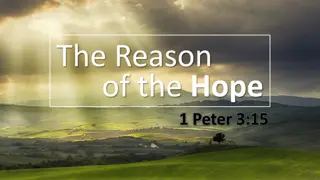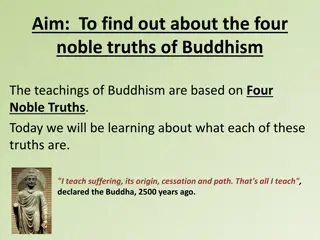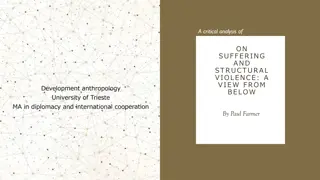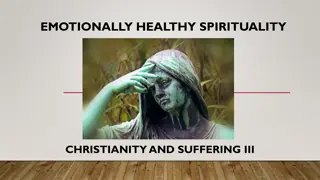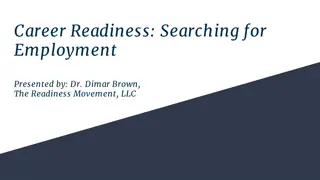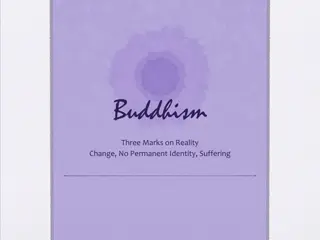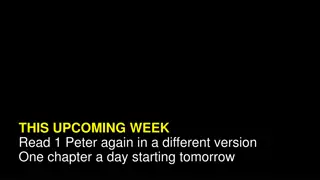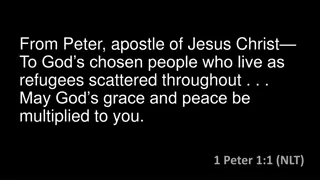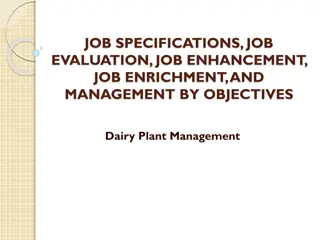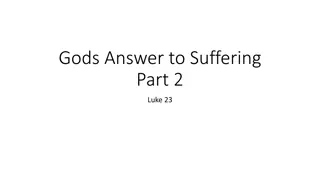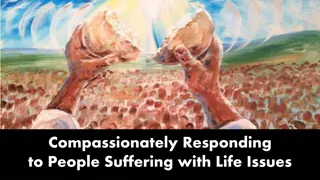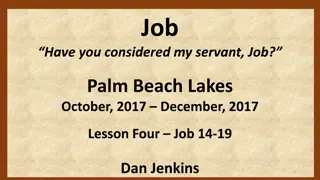The Book of Job: Suffering and Consolation
Eliphaz the Temanite speaks to Job, questioning his impatience in suffering and highlighting the consequences of wickedness. Job is visited by a spiritual presence, stirring existential questions about mortality and divine justice. In the subsequent chapter, Eliphaz reflects on the fate of the foolish and advocates for seeking God's guidance in the face of affliction.
Download Presentation

Please find below an Image/Link to download the presentation.
The content on the website is provided AS IS for your information and personal use only. It may not be sold, licensed, or shared on other websites without obtaining consent from the author.If you encounter any issues during the download, it is possible that the publisher has removed the file from their server.
You are allowed to download the files provided on this website for personal or commercial use, subject to the condition that they are used lawfully. All files are the property of their respective owners.
The content on the website is provided AS IS for your information and personal use only. It may not be sold, licensed, or shared on other websites without obtaining consent from the author.
E N D
Presentation Transcript
THE BOOK OF JOB The Suffering and Consolation of the Christian Date: 11-26-17 Lesson: 3 Text: Chapters 4,5 Theme: To God would I commit my cause, who does great things and unsearchable marvelous things without number
(Job 4:1-21) Then Eliphaz the Temanite answered and said: (2) "If one ventures a word with you, will you be impatient? Yet who can keep from speaking? (3) Behold, you have instructed many, and you have strengthened the weak hands. (4) Your words have upheld him who was stumbling, and you have made firm the feeble knees. (5) But now it has come to you, and you are impatient; it touches you, and you are dismayed. (6) Is not your fear of God your confidence, and the integrity of your ways your hope? (7) "Remember: who that was innocent ever perished? Or where were the upright cut off? (8) As I have seen, those who plow iniquity and sow trouble reap the same. (9) By the breath of God they perish, and by the blast of his anger they are consumed. (10) The roar of the lion, the voice of the fierce lion, the teeth of the young lions are broken. (11) The strong lion perishes for lack of prey, and the cubs of the lioness are scattered. (12) "Now a word was brought to me stealthily; my ear received the whisper of it. (13) Amid thoughts from visions of the night, when deep sleep falls on men, (14) dread came upon me, and trembling, which made all my bones shake.
flesh stood up. (16) It stood still, but I could not discern its appearance. A form was before my eyes; there was silence, then I heard a voice: (17) 'Can mortal man be in the right before God? Can a man be pure before his Maker? (18) Even in his servants he puts no trust, and his angels he charges with error; (19) how much more those who dwell in houses of clay, whose foundation is in the dust, who are crushed like the moth. (20) Between morning and evening they are beaten to pieces; they perish forever without anyone regarding it. (21) Is not their tent-cord plucked up within them, do they not die, and that without wisdom?' (15) A spirit glided past my face; the hair of my
(Job 5:1-27) "Call now; is there anyone who will answer you? To which of the holy ones will you turn? (2) Surely vexation kills the fool, and jealousy slays the simple. (3) I have seen the fool taking root, but suddenly I cursed his dwelling. (4) His children are far from safety; they are crushed in the gate, and there is no one to deliver them. (5) The hungry eat his harvest, and he takes it even out of thorns, and the thirsty pant after his wealth. (6) For affliction does not come from the dust, nor does trouble sprout from the ground, (7) but man is born to trouble as the sparks fly upward. (8) "As for me, I would seek God, and to God would I commit my cause, (9) who does great things and unsearchable, marvelous things without number: (10) he gives rain on the earth and sends waters on the fields; (11) he sets on high those who are lowly, and those who mourn are lifted to safety. (12) He frustrates the devices of the crafty, so that their hands achieve no success. (13) He catches the wise in their own craftiness, and the schemes of the wily are brought to a quick end. (14) They meet with darkness in the daytime and grope at noonday as in the night
(15) But he saves the needy from the sword of their mouth and from the hand of the mighty. (16) So the poor have hope, and injustice shuts her mouth. (17) "Behold, blessed is the one whom God reproves; therefore despise not the discipline of the Almighty. (18) For he wounds, but he binds up; he shatters, but his hands heal. (19) He will deliver you from six troubles; in seven no evil shall touch you. (20) In famine he will redeem you from death, and in war from the power of the sword. (21) You shall be hidden from the lash of the tongue, and shall not fear destruction when it comes. (22) At destruction and famine you shall laugh, and shall not fear the beasts of the earth. (23) For you shall be in league with the stones of the field, and the beasts of the field shall be at peace with you. (24) You shall know that your tent is at peace, and you shall inspect your fold and miss nothing. (25) You shall know also that your offspring shall be many, and your descendants as the grass of the earth. (26) You shall come to your grave in ripe old age, like a sheaf gathered up in its season. (27) Behold, this we have searched out; it is true. Hear, and know it for your good." .
STUDY NOTES: 1. Eliphaz the Temanite Teman was a town in Edom known for its wisdom. In what he says are elements of truth mixed in with earthly ponderings, which cannot grasp the inscrutable mind of God, and why the Lord has allowed Satan to afflict Job, for some high purpose known only to God. 2. He assures Job that his piety will avail well before God who will not let him perish with the wicked. 3. The blast of God s anger and his breath are severe in judgment (Ex 15:7,8; Is 30:33). 4. Eliphaz had some kind of mystical spirit experience in 4:15-17, and it raised the hair on his body. Whatever it was, the truth came out that: Can mortal man be in the right before God? Can a man be pure before his Maker? The answer to this question of course is No! (Num 12:6-8)
5. Our bodies are houses of clay and dust and a temporary tent (Gen 2:7; 3:19; 1 Cor 5:1,4; 2 Pet 1:13) 6. Holy ones = sons of God = servants=the good angels who serve God (Dt 33:2) 7. The life of a fool is pictured in 5:2-7 (Ps. 10 and Ps. 14; Prov 1:7) 8. Man is born to trouble (Gen 3:17; Ps 51:5; 58:3; 90:10; Prov 22:8) But instead we should seek God (Ps 37:5)
9. Ch. 5: 13 is quoted in 1 Cor 3:19. Also see 2 Cor 4:4 10. Ch. 5:17-26 rejoices in the blessedness of the man whom God disciplines (Prov 1:2,7; 3:12; 23:13,23) 11. Ch. 5:18,19 is echoed in Hos 6:1-2 12. In six and in seven is a poetic way of saying many. (Prov 6:16) 13. A covenant with the stones (2 Ki 3:19; Is 5:2; Mt 13:5) who will be at peace with you and leave your crops alone 14. His prediction in 5:26 will be fulfilled in 42:16,17. Overall, however, Eliphaz worldview is wrong he assumes that suffering only happens in response to our sins, and this does not help Job at all. In this book God Almighty in Hebrew is El Shaddai.
Luthers Works vol. 30 p. 126 When faith begins, God does not forsake it; He lays the holy cross on our backs to strengthen us and to make faith powerful in us. The holy Gospel is a powerful Word. Therefore it cannot do its work without trials, and only he who tastes it is aware that it has such power. Where suffering and the cross are found, there the Gospel can show and exercise its power. It is a Word of life. Therefore it must exercise all its power in death. In the absence of dying and death it can do nothing, and no one can become aware that it has such power and is stronger than sin and death. Therefore the apostle says to prove you ; that is, God inflicts no glowing fire or heat cross and suffering, which make you burn on you for any other purpose than to prove you, whether you also cling to His Word. Thus it is recorded in Wisd. of Sol. 10:12 of Jacob: God sent him an arduous contest, so that he might know that godliness is more powerful than anything. God lays a cross on all believers in order that they may taste and prove the power of God the power which they have taken hold of through faith.
LIFE APPLICATION: What does this mean to you? To God would I commit my cause, who does great things and unsearchable, marvelous things without number






